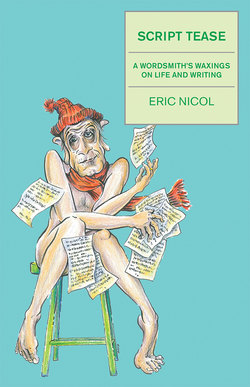Читать книгу Script Tease - Eric Nicol - Страница 24
На сайте Литреса книга снята с продажи.
ОглавлениеPERNICKETY CRITICS
Every author, on publication, goes through three emotional stages:
1. Hoping that his/her book will receive rave reviews.
2. Wondering why his/her book has received no reviews.
3. Suspecting that his/her book has become the victim of a media plot to suppress writing that makes theirs look bad, styled for the lowest form of readership.
The newborn author knows that his book’s getting a laudatory review from Mom, or a person who owes the author money, is not to be trusted as evaluation.
But how trustworthy is the review of your work by a complete stranger who doesn’t care whether you cry easily? Here it is useful to understand that literary critics come in two varieties: professional and amateur. They are often hard to distinguish, solely by their sneer. And much of their publishing space may have been lost to TV and film reviews, making them even snarlier.
With the wane of professional literary criticism — a fairly respectable genre of nitpicking dating from Aristotle through William Hazlitt, I.A. Richards, et al. — the sometime job has fallen to a reviewer. This is usually a writer who is between royalty cheques and glad to get his teeth into something, having been denied a decent steak.
What the reviewer writes is called a critique (cree-teek). A certain amount of prestige is won by your work, just to have it cree-teeked at all. Even an unfavourable review is better than drawing no notice whatever. In fact, some people make a point of reading only books that have received a scathing review. They recognize that many book reviewers are essentially attention-seekers, people whose mission in life is to stand out from the herd, even if this means leaping off a cliff.
Another comfort: the book critic is ill paid for his work, often receiving no compensation other than the copy of the book he is reviewing. Why should the author respect the judgment of a person who is earning less than a real garbage collector?
Anyway, if we are unfortunate enough to have our work receive a negative book review, what should be our reaction to this pretentious drivel? First — and memorize this counsel — remember that a critic gains a wide reputation only by being egregiously vicious. Mr. (or Ms.) Nice Guy has no future as a book critic. The late Nathan Cohen of the Toronto Star gained fame as a veritable fountain of acerbic criticism. He caused more tears than an onion-peeling contest. Formidable, but he wasn’t well loved by writers.
So if you have no history of pulling the wings off insects as recreation, literary criticism may not be your bent.
As for finding yourself on the receiving end of a nasty critique, you need to develop the mental epidermis of the thick-skinned. Keep a stiff upper lip. (If you have a chronically limp upper lip, you can have it stiffened surgically, but may find it harder to whistle for your dog, or a waiter.)
